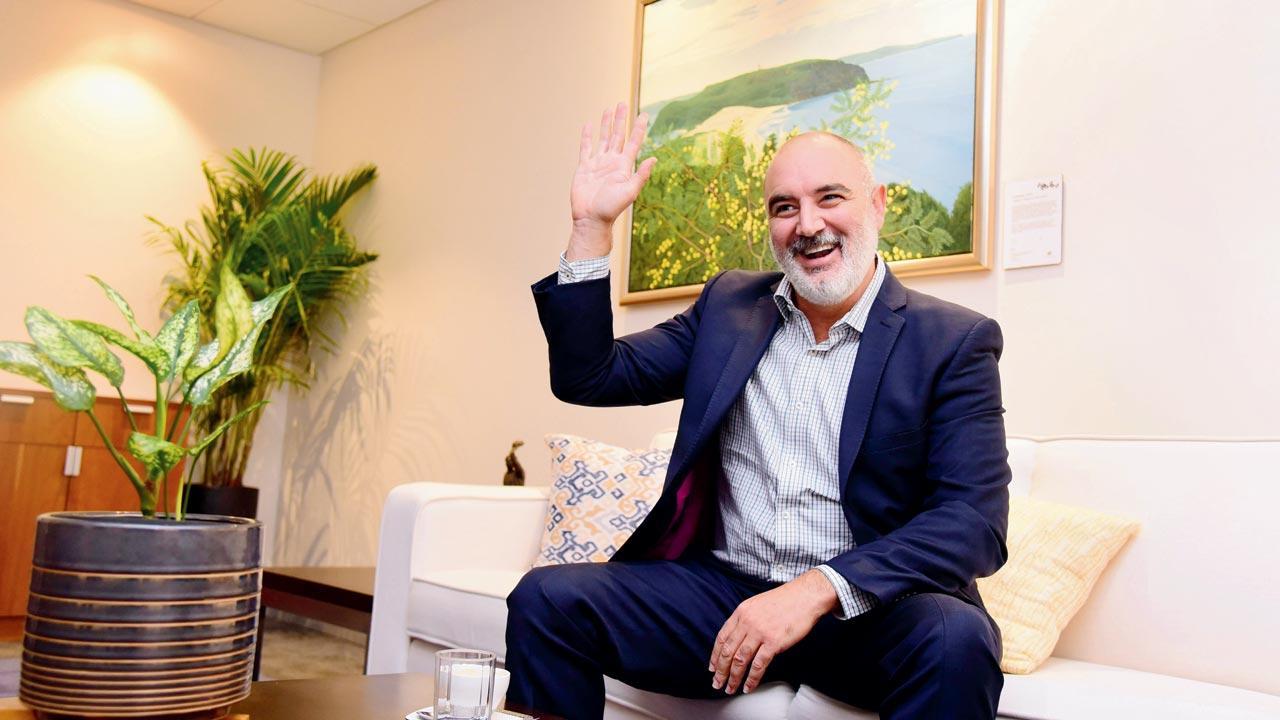From being picked as extra on a film set to assuming charge of the Australian Consulate General in Mumbai, Paul Murphy’s journey in Mumbai comes peppered with landmark moments

The new Australian Consul General in Mumbai wishes to explore regional food. And dosas are his favourite. Matunga awaits Paul Murphy. Pic/Shadab Khan
He insists on picking up an empty coffee cup instead of waiting for the staff, loves a dosa and has a Bollywood connection. He is also an economist, trade agreement expert and now the Australian Consul General in Mumbai. mid-day caught up with Paul Murphy, who is back to Maximum City for the fourth time, on a new, more exciting mission.
ADVERTISEMENT
Edited excerpts from the interview.
Can we start at the beginning…how did your association with Mumbai kick off?
I must have been around 23 when I first arrived here as a backpacker in 1999. I had travelled through Madhya Pradesh and Rajasthan and reached Mumbai by train. It was a beautiful experience, roaming the city and travelling by bus to get around.
It was slightly more eventful than that, we hear?
(Laughs) Yes. I was put up at the Salvation Army Hostel in South Mumbai; it’s where foreign nationals stayed on short stints. And so, it was hunting ground for film production crews who’d regularly turn up to look for extras in scenes involving foreigners. One such team whisked me away for a scene. I don’t remember much, except that the set was an antique shop. Someone was supposed to barge in and start smashing things, and I was to act alarmed. The only other thing I remember is that it was then that I realised that I could never be an actor.
And you returned with a more specific mission in mind.
Yes. I studied Economics at the Canberra University and joined the Treasury Service. Economics and anthropology had been my twin interests, which is why I wanted to study people as much as I wanted to make a career in economics. I came back to India in 2012, when the CECA (Comprehensive Economic Cooperation Agreement) was being negotiated. This was a time when there was only an Australian High Commission in Delhi. I worked out of Hyderabad at the time. It was also a time when trade relations between the two countries were revolving around the diamond and gold trade.
I returned in 2022, this time for the ECTA (Economic Cooperation and Trade Agreement). What had changed by this time was that strong trade relations between the two countries were more essential than optional. The Indian diaspora in Australia had grown from two hundred thousand to one million. The elected officials in Australia were keen on letting the diaspora know that they were interested in strong trade relations between India and Australia.
Is the GIFT City (Gujarat International Finance Tec-City) an outcome of this?
GIFT City is only the tip of the iceberg as far as India-Australia relations go. Yes, there are a large number of students arriving from India to study in Australia, and many more wish to. But relations in the education space got a real boost last year after the mutual recognition of educational qualifications between the two countries. Because of this, Australian universities are working on hybrid education programmes. Which means that an Indian student isn’t required to spend the whole duration of the course in Australia. This cuts down on the cost, and is opening doors for more Indian students.
You also worked in Papua New Guinea. What was that experience like?
New Guinea is lovely. It is also the place where I held my first consular post. I set up the Australian Consulate in Lae while working with the Consulate in Papua New Guinea. My stint in Lae was particularly memorable because I built the Consulate from scratch—settling in, living in hotels, getting to know the culture, recruiting local talent. Then the pandemic hit and the economy ground to a standstill. Lae is a bustling port and so, was hit badly. And many of the citizens didn’t have a centralised government ID to help with setting up bank accounts. So, we started a new scheme and issued ID cards, took stock of how many family members each applicant was supporting, and managed to create opportunities that let them earn a living wage.
How has the last one week in Mumbai been?
The city has changed, for sure, from 1999 to now. I drove down the Bandra Worli Sea Link, and had dinner at the Nita Mukesh Ambani Cultural Center. I’m looking forward to seeing more of the city. I love Indian food! In Australia, we have a chain called Dosa Hut that serves authentic south Indian fare. And Sydney has a sprawling arcade of Indian-run stores that take up an entire floor in a shopping centre.
And you plan to spend some time digging up which film/teleserial cast you in 1999?
God, no! I don’t want to be reminded of it. I think I’ve revealed too much on that front already!
 Subscribe today by clicking the link and stay updated with the latest news!" Click here!
Subscribe today by clicking the link and stay updated with the latest news!" Click here!







